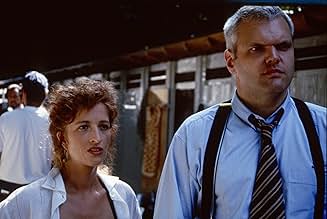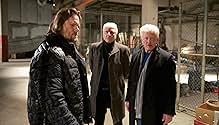Une série policière allemande, au succès non démenti, où des détectives cherchent à résoudre des crimes.Une série policière allemande, au succès non démenti, où des détectives cherchent à résoudre des crimes.Une série policière allemande, au succès non démenti, où des détectives cherchent à résoudre des crimes.
- Récompenses
- 127 victoires et 180 nominations au total
Parcourir les épisodes
Avis à la une
They are more than 30 individual TV shows, Some of the best to me is
1.Cenk Batu -Undercover Agent
2.Fegefeuer the english is Purgatory
3.Bukow and Konig
My wife and I just completed watching all 34 episodes of "Tatort: Borowski", which is about a detective from Kiel, Germany. Pros: The lead detective (Inspector Borowski) is an excellent detective. The plots keep you guessing: you're never sure who did it. Cons: There are obvious holes in many of the plots. In some cases, the episode ends with no resolution of important issues raised in the plot. My wife and I are giving the series a 7.0: it's ok, but we are not recommending it (anything below 7.0, we normally don't watch).
How do you review a series of over 1100 episodes? I have to start by admitting I've only seen thirteen "Lindholm" programmes and two "Cologne" ones.
The first thing that struck me was the cheesy seventies theme music and the dreadful title sequences. I'd honestly thought that I'd downloaded something from fifty years ago. However, it turned out that the Lindholm episodes were set in a recent past where primitive mobile phones were used in the earlier episodes and smartphones towards the later ones. I learnt that the theme and titles had remained the same for fifty years and the programme makers keep them as a tradition.
Despite the Lindholm episodes having the same star, Maria Furtwangler, it's clear that the different programmes were written and directed by a myriad of varied people. The styles were completely different as was the dialogue and plot development. One thing that was consistent and was, I assume, a basic template was that Frau Hauptkommissarin Lindholm was always close to the edge both in her personal life and her investigations. She broke rules with impunity and, in reality, wouldn't have lasted five minutes in any LKA or even local police station.
A few of the cases were solved by coincidences even when she knew who the perp was but she sometimes wasn't allowed to arrest as she didn't have the evidence. However, a chance meeting or finding led her to get her man. It was also slightly annoying that car accidents played such a large part in some of the plots.
Her personal life was a shambles and men came and went with no seeming reason. Mum was on hand to look after her child who simply didn't figure in the final episode.
I can't say much about the couple of Cologne ones I've seen as it was a long time ago, but they seemed to be darker.
All told, the stories were not boring and held the attention for the ninety minutes of each episode. They aren't the most scintillating television I've seen, but worth a look on a rainy afternoon.
The first thing that struck me was the cheesy seventies theme music and the dreadful title sequences. I'd honestly thought that I'd downloaded something from fifty years ago. However, it turned out that the Lindholm episodes were set in a recent past where primitive mobile phones were used in the earlier episodes and smartphones towards the later ones. I learnt that the theme and titles had remained the same for fifty years and the programme makers keep them as a tradition.
Despite the Lindholm episodes having the same star, Maria Furtwangler, it's clear that the different programmes were written and directed by a myriad of varied people. The styles were completely different as was the dialogue and plot development. One thing that was consistent and was, I assume, a basic template was that Frau Hauptkommissarin Lindholm was always close to the edge both in her personal life and her investigations. She broke rules with impunity and, in reality, wouldn't have lasted five minutes in any LKA or even local police station.
A few of the cases were solved by coincidences even when she knew who the perp was but she sometimes wasn't allowed to arrest as she didn't have the evidence. However, a chance meeting or finding led her to get her man. It was also slightly annoying that car accidents played such a large part in some of the plots.
Her personal life was a shambles and men came and went with no seeming reason. Mum was on hand to look after her child who simply didn't figure in the final episode.
I can't say much about the couple of Cologne ones I've seen as it was a long time ago, but they seemed to be darker.
All told, the stories were not boring and held the attention for the ninety minutes of each episode. They aren't the most scintillating television I've seen, but worth a look on a rainy afternoon.
I am German and I love German filmmaking, they are able to produce great stuff but they can also produce a huge mess, and "Tatort" shows both sides of the coin.
There are great episodes especially the "Duisburg-Tatort" form the 1980s with Inspector Schimanski.
He was representing the typ of man who lived in the "Ruhrpott" at that time, he was harsh sometimes, drunk a lot and bad organized but he loved the work he was doing and he had great respect for the people who lived in the area because he was one of them.
I highly recommend the episode "Duisburg-Ruhrort" from the early 1980s, it's absolutely amazing, a masterpiece of German filmmaking!!!
So glory the past, so annoying is the present, all "Tatort" episodes no matter where they are if in southern or northern Germany, eastern or western, they have mixed up to a confusable, monotonous and discouraged mass.
I gave the show three stars because the old episodes are great and I hope that there will come better times, but today it is not worth more then 3/10.
There are great episodes especially the "Duisburg-Tatort" form the 1980s with Inspector Schimanski.
He was representing the typ of man who lived in the "Ruhrpott" at that time, he was harsh sometimes, drunk a lot and bad organized but he loved the work he was doing and he had great respect for the people who lived in the area because he was one of them.
I highly recommend the episode "Duisburg-Ruhrort" from the early 1980s, it's absolutely amazing, a masterpiece of German filmmaking!!!
So glory the past, so annoying is the present, all "Tatort" episodes no matter where they are if in southern or northern Germany, eastern or western, they have mixed up to a confusable, monotonous and discouraged mass.
I gave the show three stars because the old episodes are great and I hope that there will come better times, but today it is not worth more then 3/10.
There's not a single comment (so far) for 'Tatort'? That's really hard to believe, since it's a very long running and popular series here in Germany. I have seen some episodes, but not enough to consider myself an expert on the series. If you are an expert, please go ahead and add another comment.
Normally I always include a rating for the titles I comment on, but I think it would be unfair to do so in this case. I don't think I have seen any of the episodes from the 70s except for 'Reifezeugnis', and I haven't seen many of those of later years. I don't consider myself an avid fan of the series.
So what can I tell you about 'Tatort' ('crime scene')? The basic idea is interesting. There are about 35 episodes per year (at least nowadays). But you don't get to see the same team of detectives in every episode. There are different teams from different parts of Germany; that's what makes it interesting. (Some episodes even feature teams from other countries, namely Austria and Switzerland.)
But I think that, at least nowadays, too many episodes suffer from bad scripts. Often the cases are too confusing because they cram too much into the 90 minutes running time. If you are interested in examples, go to the user comments page for the episode 'Das Böse'. I have written a comment on it. There's also a somewhat similar comment for 'Der Kormorankrieg', titled 'Execrable' and written by a user called 'moabitnik'. (Please keep in mind that user comments are subject to change and deletion. Though it's unlikely, a comment might be different or gone tomorrow. I only refer to other comments because I think it would be redundant to repeat information that can be read elsewhere.) And I think that in many scripts there's too much 'political correctness', for example there are too many iffy 'power women' among the detectives.
Some more information that might be of interest:
Some episodes were only shown in Austria. They are listed as a spin-off on the 'movie connections' page for 'Tatort'.
'Reifezeugnis' is perhaps the most famous episode. It was directed by Wolfgang Petersen of 'Das Boot' fame and stars a young Nastassja Kinski.
I guess Schimanski, played by Götz George, is the most popular 'Tatort'-detective. He got a spin-off series and two theatrical movies were made with him.
The German experimental rock band Tangerine Dream wrote the title track for 'Das Mädchen auf der Treppe' and scored a hit with it in Germany.
Some episodes are no longer shown as reruns because their content is deemed too controversial. Some episodes have been edited after their original airing, for example because of unwanted product placement.
Every German who has a TV set is required by law to pay fees for the station that produces 'Tatort'. Believe it or not, you have to pay for it even if you don't watch it. So the makers don't have to try hard to get funding for the next episodes. I guess the quality of the series might improve if they had to try harder.
Based on the episodes I have seen in the last few years, I would give 'Tatort' a rating of four points out of ten. But, as I have mentioned above, I might be wrong, since I haven't watched many of the episodes, so I won't rate it.
Edit / addition (27th August 2008): In the last months, I have seen some reruns of old episodes from the 70s and 80s, and some new episodes. There were a lot of good episodes among both of these, so I would now give the series a rating of six points out of ten, because I now guess that the ratio of bad episodes is lower than I had thought before.
Normally I always include a rating for the titles I comment on, but I think it would be unfair to do so in this case. I don't think I have seen any of the episodes from the 70s except for 'Reifezeugnis', and I haven't seen many of those of later years. I don't consider myself an avid fan of the series.
So what can I tell you about 'Tatort' ('crime scene')? The basic idea is interesting. There are about 35 episodes per year (at least nowadays). But you don't get to see the same team of detectives in every episode. There are different teams from different parts of Germany; that's what makes it interesting. (Some episodes even feature teams from other countries, namely Austria and Switzerland.)
But I think that, at least nowadays, too many episodes suffer from bad scripts. Often the cases are too confusing because they cram too much into the 90 minutes running time. If you are interested in examples, go to the user comments page for the episode 'Das Böse'. I have written a comment on it. There's also a somewhat similar comment for 'Der Kormorankrieg', titled 'Execrable' and written by a user called 'moabitnik'. (Please keep in mind that user comments are subject to change and deletion. Though it's unlikely, a comment might be different or gone tomorrow. I only refer to other comments because I think it would be redundant to repeat information that can be read elsewhere.) And I think that in many scripts there's too much 'political correctness', for example there are too many iffy 'power women' among the detectives.
Some more information that might be of interest:
Some episodes were only shown in Austria. They are listed as a spin-off on the 'movie connections' page for 'Tatort'.
'Reifezeugnis' is perhaps the most famous episode. It was directed by Wolfgang Petersen of 'Das Boot' fame and stars a young Nastassja Kinski.
I guess Schimanski, played by Götz George, is the most popular 'Tatort'-detective. He got a spin-off series and two theatrical movies were made with him.
The German experimental rock band Tangerine Dream wrote the title track for 'Das Mädchen auf der Treppe' and scored a hit with it in Germany.
Some episodes are no longer shown as reruns because their content is deemed too controversial. Some episodes have been edited after their original airing, for example because of unwanted product placement.
Every German who has a TV set is required by law to pay fees for the station that produces 'Tatort'. Believe it or not, you have to pay for it even if you don't watch it. So the makers don't have to try hard to get funding for the next episodes. I guess the quality of the series might improve if they had to try harder.
Based on the episodes I have seen in the last few years, I would give 'Tatort' a rating of four points out of ten. But, as I have mentioned above, I might be wrong, since I haven't watched many of the episodes, so I won't rate it.
Edit / addition (27th August 2008): In the last months, I have seen some reruns of old episodes from the 70s and 80s, and some new episodes. There were a lot of good episodes among both of these, so I would now give the series a rating of six points out of ten, because I now guess that the ratio of bad episodes is lower than I had thought before.
Le saviez-vous
- AnecdotesThe longest-running German TV drama series, which is produced and aired continuously since 1970.
- ConnexionsFeatured in Zomergasten: Épisode #10.3 (1997)
- Bandes originalesTatort Theme Song
Written by Klaus Doldinger
Meilleurs choix
Connectez-vous pour évaluer et suivre la liste de favoris afin de recevoir des recommandations personnalisées
- How many seasons does Tatort have?Alimenté par Alexa
Détails
- Date de sortie
- Pays d’origine
- Sites officiels
- Langue
- Aussi connu sous le nom de
- Sur les lieux du crime
- Sociétés de production
- Voir plus de crédits d'entreprise sur IMDbPro
- Durée1 heure 30 minutes
- Couleur
- Mixage
- Rapport de forme
- 1.33 : 1
- 16 : 9
Contribuer à cette page
Suggérer une modification ou ajouter du contenu manquant


![Regarder DVD Trailer [OV]](https://m.media-amazon.com/images/M/MV5BYTlkMDA5M2MtNDMxNi00ODkzLWFjNWUtMjFjMjFjZjBjZWQ3XkEyXkFqcGdeQXRyYW5zY29kZS13b3JrZmxvdw@@._V1_QL75_UX500_CR0)
![Episode Trailer [OV]](https://m.media-amazon.com/images/M/MV5BNjM4YjAxMTYtN2U3NC00NTY0LTg4NGQtYjA2MmY3NzY5OWU0XkEyXkFqcGdeQXRodW1ibmFpbC1pbml0aWFsaXplcg@@._V1_QL75_UX500_CR0)
























